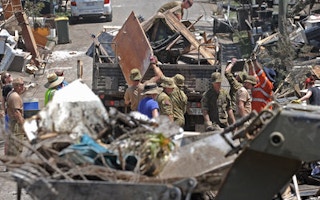Residents of areas hit by natural disasters such as cyclones and storms could face carbon tax bills for the greenhouse emissions arising from rubbish created by the disaster, a Senate estimates hearing was told yesterday.
The revelation came as the government released a list of 104 local councils it believes may have to pay the tax because of the carbon emissions from rubbish dumps, 46 of which are in NSW and 21 in Victoria.
Queensland Liberal senator Ian Macdonald quizzed officials from the Department of Climate Change over claims by the Cassowary Coast Regional Council in Queensland that it faces a carbon tax bill of about $2 million to cover the waste from cyclone Yasi in February last year.
Under the carbon tax, due to start July 1, rubbish dumps, some of which are privately run but many of which are operated by local councils, will pay for emissions released when rubbish is burnt or decomposes, if those emissions total more than 25,000 tonnes a year.
But unlike large corporations, which have typically been keeping track of their greenhouse emission for some years, most local councils are newcomers to the process, sparking concerns they will struggle to cope.
Department officials stressed that the list of 104 councils would probably come down to about 70 that would eventually pay the tax.
Liberal senator Simon Birmingham said of the carbon tax: ”It’s a huge impost on local government, many of whom are probably going to be ill-equipped to deal with the complexities of carbon pricing. They’re not, in the main, big corporations.”
Senator Macdonald said that Cassowary council had to cope with 25 times its normal amount of rubbish after Yasi. About 100,000 tonnes went into temporary storage, on which ratepayers may now have to pay the carbon tax. ”This could equally happen to any council in Sydney or Melbourne that might have a natural calamity that requires increased deposits to landfill,” he said.
A spokeswoman for the parliamentary secretary for climate change, Mark Dreyfus, said the council might not have to pay the tax, though the department would discuss the issue with the council.
In any event, councils could burn off harmful methane emissions and earn Carbon Farming Initiative credits, which they could then sell to bigger emitters. She also said that any increases in rates paid by residents had been taken into account when the government calculated its compensation package, which averages $10.10 a week for each household.










